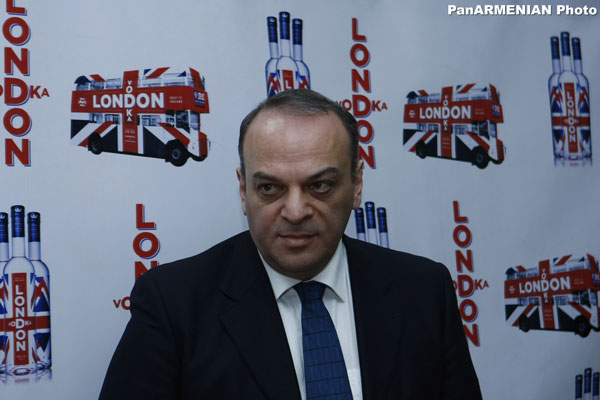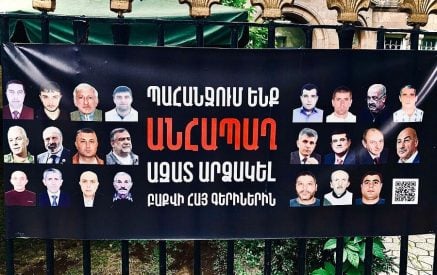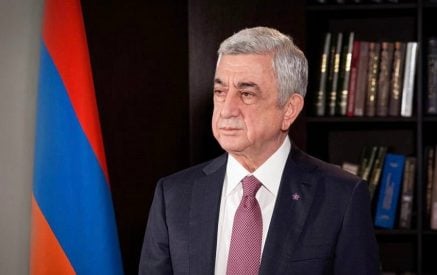Former NKR Foreign Minister’s Council to co-chairs, diplomats, and officials
“With regard to the conflict settlement, a new phase will begin only when the negotiation agenda will undergo necessary changes, and the elements will be introduced, the absence of which allows today to distort the origin and development history of the conflict, and arbitrarily adapt the proposed peaceful settlement resolution to this-or-that current geo-political interests. We are still in the “old phase,” said the former NKR foreign minister Arman Melikyan in the conversation with “Aravot,” in response to our question of whether a new phase is beginning on the settlement of the Nagorno-Karabakh conflict.
Recall, that yesterday the OSCE Minsk Group co-chairs had issued a statement associated with the 20th anniversary of the Nagorno-Karabakh ceasefire, in which the issues of “occupied territories” and the impossibility of maintaining a status quo, seems, are pushed to the first plan. Recall also before that, recently, the OSCE Minsk Group Co-Chair James Warlick had published his own six-element approaches on the conflict regulation, in which he spoke of returning the “occupied territories”. Yesterday, at the Parliament, the RA Deputy Foreign Minister Shavarsh Kocharyan, in the conversation with the journalist, responded quite blurring to the observations of the co-chairs. So was the reaction to Warlick’s statement. To the observation of Aravot whether the RA Foreign Ministry has adopted a right posture, Arman Melikyan responded, “Foreign Ministry’s today’s posture is not contrary to so far adopted political line, the Ministry of Foreign Affairs, usually, welcomes all initiatives made by the Co-chairs, and he considers Azerbaijan to be blamed for inefficiency of the negotiation process. This, of course, is a passive political approach, which is also the result of the mistakes made earlier. I believe that our negotiating position today could be much more favorable. This, of course, is a subjective estimation.”
In fact, the American Ambassador James Warlick had said that the six elements on Nagorno-Karabakh issue were his approached, but the co-chairs actually supported it. To the question of how do you assess it, Arman Melikyan responded, “He, in fact, nobly took the first strike of criticism on him.” Also, he added, “I noticed some information on the Internet, according to which, the U.S. Embassy to Armenia found it necessary to remind the critics of Warlick’s recent speech that the Nagorno-Karabakh conflict settlement has three options: extension of the status quo unacceptable for everyone, resumption of war, and a negotiation way that suggests that parties in conflict will be committed to go for concessions. The Embassy hopes that these critics will be reasonable and will choose peace. There is, of course, also a fourth option – recognition of Artsakh independence by the United States and its allies or by Russia and its allies, the recent historical and legal precedents of which are before our eyes.” Arman Melikyan thinks that it is much more important to once again remind our American and Russian diplomatic friends that it would be possible to speak about the real concessions only in the case of ensuring the rules of fair game. “When during the conflict, one of the most affected parties, the Azerbaijani-Armenian refugees’ fundamental rights and interests are deliberately disregarded, it turns out that the whole picture of the conflict is distorted. And the Madrid principles are called for only to fix this distortion, which makes the lofty calls about concession meaningless, turning them into a dangerous verbiage, which simply camouflages the actual abuse of half a million Azerbaijani-Armenians’ interests, and falseness of suggested “concession” solution based on this one-sided justice. Over the years, the international organizations have thrown pennies to Armenian officials just for the fact that our national elders voluntarily agree to fall into oblivion about the Armenian refugees’ problem, to conceal it in the heavy mist of false refugee integration programs. It would be impossible to evade the Armenian refugees’ problem. There is a direct connection established, maintained and expanded with tens of thousands of refugee families, so I would like to give an advice, dear Co-chairs, diplomats and local officials, the sooner you start dealing with the Armenian refugees problem, the sooner we will come to adequate concessions. If you continue with the same style, then it will mean…”.
Read also
The Minister of Europe David Lidington has also come up with a statement, particularly noting, “The elements making up a deal, including the return of occupied territories and the acceptance of a free expression of will on the status of Nagorno-Karabakh, were once again set out clearly on 7 May by the US Co-Chair, Ambassador James Warlick. I hope both leaderships show the political courage to bring about this solution for the people of Armenia, Azerbaijan, and Nagorno-Karabakh.” To the question of Aravot whether again the time for returning the territories has came, our interlocutor said, “What is said by the Madrid principles is something like a minefield for the three parties in conflict, where a single wrong move can be fatal and lead to irreparable consequences. In this field, the Armenian sides still have some tactical advantage to the enemy. It is important to understand that the basic problem is not the practical application of the proposed principles but not to explode on the political mine during the interim “examination periods” of the process.”
NELLY GRIGORYAN





















































